What is water weight?
You’ve probably heard the term, but what does it mean exactly? According to Bridget Murphy, RD, at NYU Langone Medical Center in New York, our bodies are 60 to 70 percent water. Eating too much of certain foods, or not enough of others, causes your body to hold onto extra water, making you feel bloated and puffy.
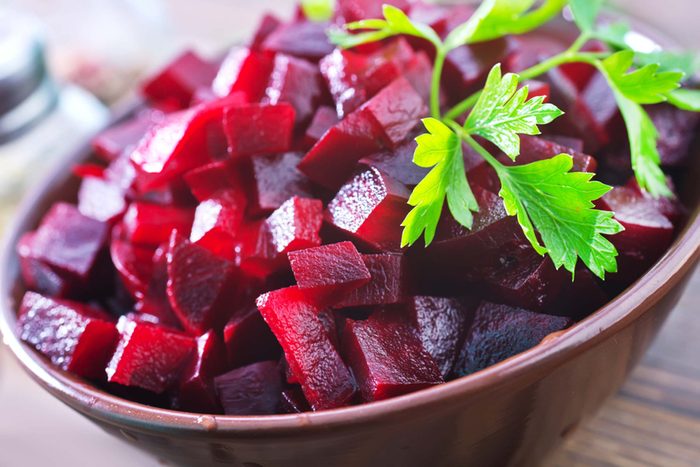
You’re skimping on antioxidants
Eating more vegetables and fruits that contain antioxidants can help you lose water weight, says Murphy. “Research supports an increase in antioxidants to help to flush our system and reduce water retention, as they bind to and neutralize free radicals,” Murphy says. “My biggest recommendation when it comes to foods high in antioxidants is to ‘eat the rainbow,’ meaning find a natural food source from each color.” Some options she suggests are red bell peppers, tomatoes or strawberries for red; carrots or butternut squash for orange; squash or artichokes for yellow; leafy greens like spinach or kale for green; and blueberries, purple beets, or eggplant for blue. And since knowledge is power, here are 10 things that experts want you to know about water weight.

You’re splurging on salt
Have you ever had a fast food meal and then later felt bloated? That could be because of an increase in water retention due to all the salt you ate. For people who eat too much sodium on a regular basis, the effects could be long-lasting. “Sodium plays a large role in fluid balance in the body,” says Erin Palinski-Wade, RD, a certified diabetes educator and author of Belly Fat Diet For Dummies. But, Murphy explains, “The higher sodium in our blood will demand a higher water volume to maintain homeostasis or balance of micro-nutrients in our blood,” she says. “This is also why high sodium will increase blood pressure.” And it’s not just table salt we’re talking about—highly processed foods and lunch meat also tend to be high in sodium, so read nutrition labels carefully.
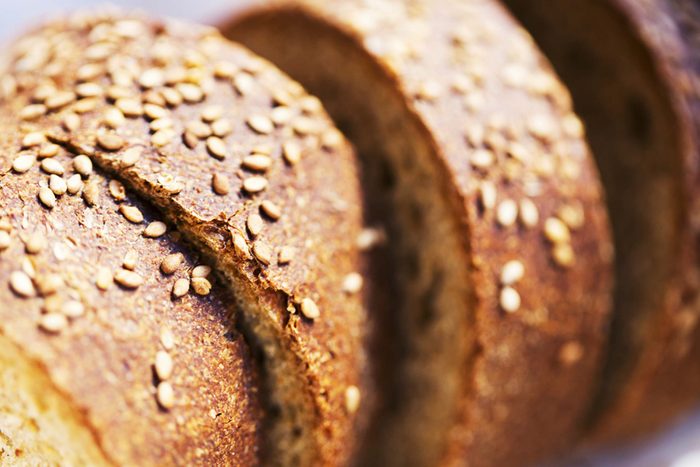
You’re overdoing the carbs
Sugar and carbs (which turn into sugar) are also surprising triggers of water retention. “When you consume carbohydrates, they are converted into glycogen, which is stored in the muscle as energy,” Palinski-Wade says. “For every gram of glycogen stored, the body holds onto about three times as much water.” And 120 grams of glycogen contributes a pound of weight from water. Unless you’re burning through all your carb stores, as an elite athlete might, you’re probably retaining excess water. “When you overload on sugar or go on a carb binge, you hold onto more water as your body stores these excess carbs as glycogen,” Palinski-Wade says. Keep in mind that carbohydrates are good for you overall, and can be found in foods like fruit, grains, starchy veggies, and things like legumes. What you may want to avoid are refined carbs, which are typically processed foods that have had the fiber and nutrients removed, like white bread, white rice, pastries, and snacks. Worried you’re eating too many carbs—especially the wrong ones? There are warning signs to look for that suggest your carb intake is too high.

You’re on a fad diet or cleanse
Although you don’t want to eat too many carbs, you don’t want to cut out all carbs either. You might drop fluid fast at first as your body burns through your carb stores, but you won’t be able to maintain it. “Fad ‘fasting’ diets will typically be very low in carbohydrate, so we lose water weight quickly when the glycogen stores are not replenished,” Murphy says. “The only problem with that is when we eat a regular diet again, we re-gain it all with the glycogen stores being filled—and sometimes more, depending on the cravings we’ve denied ourselves, and the overeating we may be more susceptible to!” According to the American Academy of Nutrition and Dietetics, most fad diets, including Atkins and Zone, aren’t healthy, don’t result in long-term weight loss, and can even be dangerous for your health. “Red flags when following any diet plan are if the diet promotes avoiding complete food groups, is unsustainable for long periods of time, or promotes any one nutrient or product as a ‘detox’ or ‘cleanse,'” Palinski-Wade says. “The body cleanses itself using the liver and kidneys quite efficiently.” In addition, limiting calories too much can cause the body to hold onto water, she says. So if you’re looking for how to lose water weight permanently, keeping a nutritionally balanced intake is the way to go.

You’re spending too much time sitting
If you’re not getting physical activity, you may be retaining fluids—but getting moving is one way you can lose water weight. “Exercise is key to promoting circulation in the body,” Palinski-Wade says. “If you sit for long periods of time, blood and fluid can pool in your lower extremities, causing fluid retention and swollen feet or ankles.” But, simply sweating is not enough to lose water pounds permanently because you’ll gain it back as soon as you rehydrate—plus, if you get too dehydrated from sweating, like when it’s very hot out, you’ll actually retain water (more on this later). Make sure you watch out for these nine subtle signs you’re drinking too much water.
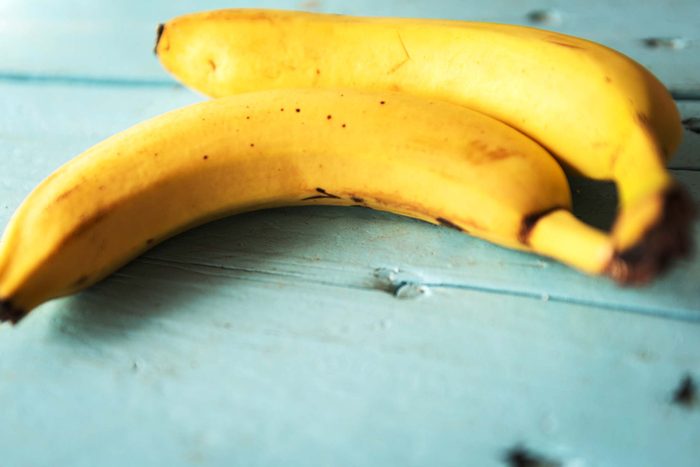
You’re missing potassium
What to eat is just as important as what not to eat when it comes to retaining water. Eating foods that contain a lot of potassium, like bananas, tomatoes, spinach, and avocados, could help you lose excess fluid. “Potassium works along with sodium to regulate fluid balance in the body,” Palinski-Wade says. “Increasing your potassium intake by eating potassium-rich foods may help your body to shed excess water.” According to the National Institutes of Health, potassium is present in all body tissues and is required for normal cell function because of its role in maintaining intracellular fluid volume.
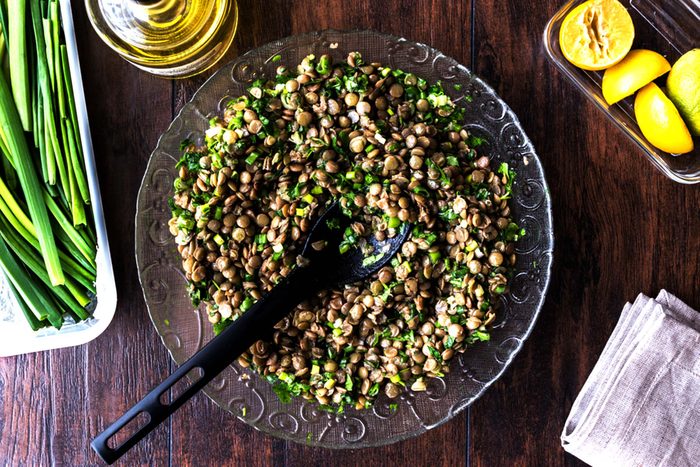
You’re not filling up on fiber
Foods high in fiber can help make you go—and a big part of getting rid of retained fluid is waste management. “Foods high in insoluble fiber help to add bulk to our stool, making it easier to maintain regular bowel movements,” Murphy says. Not eating enough fiber may make you constipated, contributing to bloat. Plus, a 2015 study in the Annals of Internal Medicine found that a diet high in fiber was effective for weight loss in general. According to the Academy of Nutrition and Dietetics, women should have 25 grams of fiber per day, and men 38 grams (or 21 and 30 grams respectively if you’re over 51 years old). The best source of fiber is from whole foods (not supplements), including grains, vegetables, fruit, and legumes—and here’s why fiber is so good for your health.

You don’t drink enough water
Ironically, drinking a lot of water helps prevent water retention. “If you are even slightly dehydrated, your body will hold onto water versus shed it,” Palinski-Wade says. “Adequate hydration can help to promote water weight loss.” Murphy says this is almost like an “insurance policy” to protect against dangerous levels of dehydration. “Drinking water does help to ‘flush out’ a person’s system,” she says. “By replenishing the water within our body daily, it can help ensure the proper flow of blood and lymph [a clear fluid that cleanses tissues in the body].” Murphy says to drink about one ounce per kilogram of body weight—or take your weight in pounds, divide by two, and drink that many ounces of water per day. If you don’t like the taste of water, try upping your intake of hydrating foods, like cucumber, watermelon, celery, cantaloupe, and broth-based soups—then, take a look at these 13 genius tricks for staying hydrated.
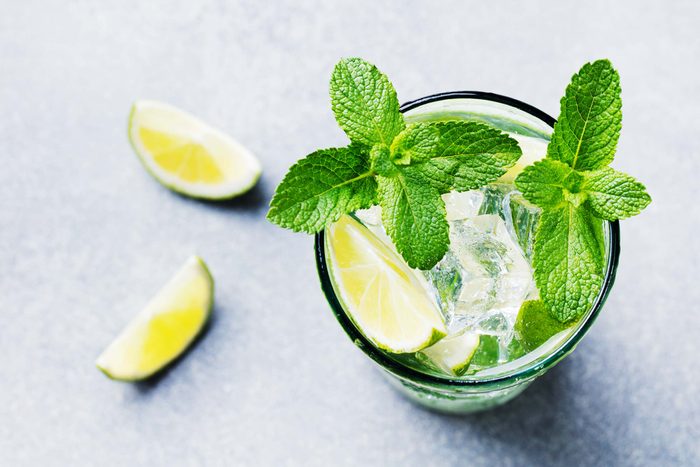
You’re indulging in alcohol
One fluid you should not consume too much of is alcohol, which can majorly dehydrate you. “As alcohol is a diuretic, drinking large amounts can contribute to this water-holding,” Murphy says. But there are other surprising reasons why alcohol can cause you to retain water. “Mixed drinks using sugary sodas, juices, or other mixers will cause bloat that we find with higher carbohydrate content,” she says. “Beer is also higher in carbohydrate and will contribute to this effect.” Plus, she says our liver is working overtime to get rid of the alcohol, which means it’s not processing calories from food. “My recommendation would be to alternate alcoholic drinks with water or seltzer water to maintain proper hydration throughout the night,” Murphy says. Here are some easy ways to cut back on alcohol.
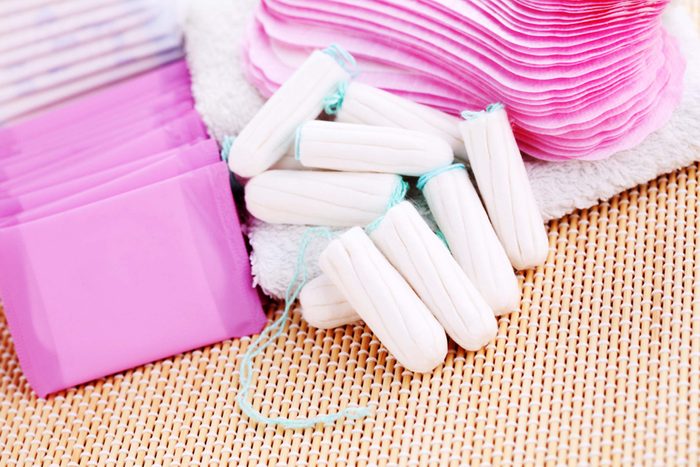
You’re about to get your period
If you menstruate, this is one reason you might also retain water. “The surge of hormones necessary just before our period to release the uterine lining actually causes our bodies to retain more fluid as part of the preparation,” Murphy says. “Women can gain anywhere from 3 to 10 pounds from this water weight the week before your period.” Once you start your period, the weight will return to normal. “So, this weight gain is just in that week before,” Murphy says. In order to relieve symptoms, stay away from salty foods, stay hydrated, and exercise. And when you’re feeling bloated, these are the best foods to eat.
